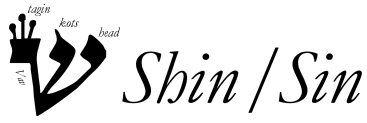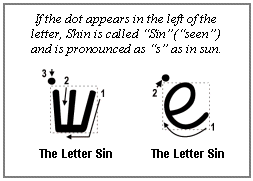 |
|||||||||||||||||||||||||||||||||||||||||||||||||||||||
|
Phonetics |
The twenty-first letter of the Hebrew alphabet is called “Shin” (pronounced “sheen”) and has the sound of “sh” as in “shy.” |
||||||||||||||||||||||||||||||||||||||||||||||||||||||
|
In modern Hebrew, the letter Shin can appear in three forms: |
|||||||||||||||||||||||||||||||||||||||||||||||||||||||
 |
|||||||||||||||||||||||||||||||||||||||||||||||||||||||
|
Manual Print (block) |
Write the manual print version (or "block" version) of Shin as follows: |
||||||||||||||||||||||||||||||||||||||||||||||||||||||
|
Learn Hebrew |
|||||||||||||||||||||||||||||||||||||||||||||||||||||||
 |
|||||||||||||||||||||||||||||||||||||||||||||||||||||||
|
Two strokes are used to create this letter. |
|||||||||||||||||||||||||||||||||||||||||||||||||||||||
|
Hebrew Script (cursive) |
And the cursive version: |
||||||||||||||||||||||||||||||||||||||||||||||||||||||
|
Audio Tanakh |
|||||||||||||||||||||||||||||||||||||||||||||||||||||||
 |
|||||||||||||||||||||||||||||||||||||||||||||||||||||||
|
This letter looks a little like an English cursive lowercase “e.” |
|||||||||||||||||||||||||||||||||||||||||||||||||||||||
|
Write the letter Shin (from right to left) in both manual print and script several times: |
|||||||||||||||||||||||||||||||||||||||||||||||||||||||
|
Practice |
|||||||||||||||||||||||||||||||||||||||||||||||||||||||
 |
|||||||||||||||||||||||||||||||||||||||||||||||||||||||
|
Note: The sole difference between the letter Shin and the letter Sin (pronounced “seen”) is the presence or absence of the dot. If a dot appears to the upper right of the letter, pronounce “sh”; if it appears to the left, pronounce “s.” |
|||||||||||||||||||||||||||||||||||||||||||||||||||||||
|
The Letter |
|||||||||||||||||||||||||||||||||||||||||||||||||||||||
 |
|||||||||||||||||||||||||||||||||||||||||||||||||||||||
|
Summary |
 |
||||||||||||||||||||||||||||||||||||||||||||||||||||||
|
Note also that some academic Hebrew books use an “s” with a caret on top to transliterate Sin and reserve “s” for Samekh. On this web site, we transliterate both Sin and Samech as “s.” |
|||||||||||||||||||||||||||||||||||||||||||||||||||||||
|
The Four-Headed Shin |
|||||||||||||||||||||||||||||||||||||||||||||||||||||||
 |
|||||||||||||||||||||||||||||||||||||||||||||||||||||||
|
The letter Shin appears engraved on both sides of the head tefillin. On the right side, the Shin has three heads, while on the left side it possesses four. If you look closely, it is possible to see an additional three-headed Shin formed from the spaces between the four heads. The three-headed Shin is the Shin of this world, while the four- headed Shin is the Shin of the World to Come. |
|||||||||||||||||||||||||||||||||||||||||||||||||||||||
|
| |||||||||||||||||||||||||||||||||||||||||||||||||||||||
|
Advanced Information |
|||||||||||||||||||||||||||||||||||||||||||||||||||||||
 |
|||||||||||||||||||||||||||||||||||||||||||||||||||||||
|
Hebrew for Christians |
|||||||||||||||||||||||||||||||||||||||||||||||||||||||
2011. 6. 24. 22:01
